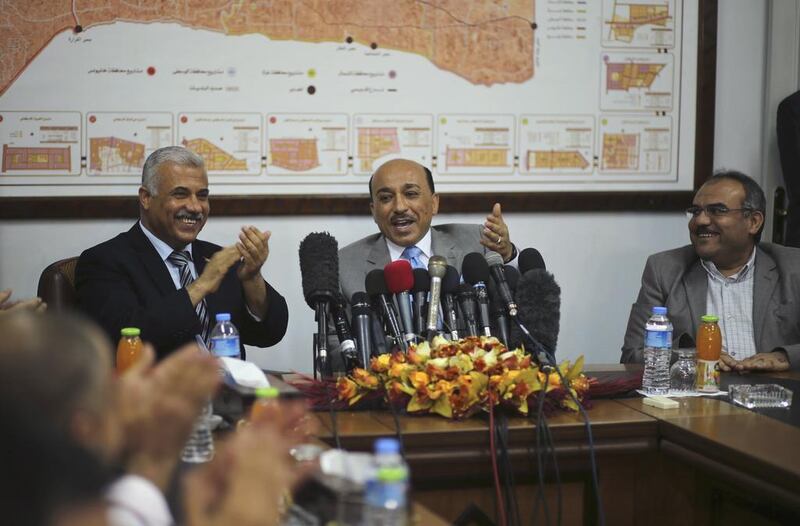GAZA // Islamist Hamas handed control of two government ministries in Gaza to members of the new Palestinian unity government on Wednesday, a further sign of reconciliation between the rival factions after the collapse of peace talks with Israel.
Palestinian president Mahmoud Abbas swore in the cabinet on Monday in a deal with Hamas that elicited a US pledge to work with and fund the new administration, setting Washington on a collision course with Israel, which has shunned it.
Hamas, which advocates Israel’s destruction, has run the Gaza Strip since seizing the territory from Mr Abbas’s Fatah forces in a brief civil war in 2007. Numerous past fence-mending efforts fell through over power-sharing disputes.
The new government’s main aim is to facilitate presidential and parliamentary elections to be held within six months, after which a permanent administration is set to take over.
In Gaza, new cabinet ministers Saleem Al Saqqa, a Gaza lawyer, and Mufeed Al Hassayna, a US-educated engineer, took over from outgoing Hamas ministers respectively at the justice department and the housing and public works ministry.
The moderate Mr Abbas, whose Palestinian Authority exercises limited self-rule in the Israeli-occupied West Bank and depends on foreign aid, appears to have banked on western acceptance of a 16-member cabinet of what he described as politically unaffiliated technocrats.
Ehab Bessaiso, spokesman for the new administration, said ministers in the West Bank had already assumed their posts and only two more ministries in Gaza remained for handover in the coming days.
But he said the new cabinet’s ability to function would be harmed by Israeli curbs on officials wishing to cross Israel to travel between the two separated Palestinian territories and called for international help to press Israel to remove the ban.
“Restrictions on movement are an attempt to undermine the work of the unity government. It was the first declared step by Israel but it is a tough one and it will affect the mission of ministers so we call on the international community to compel Israel to remove these unjust measures,” Mr Bessaiso said.
Setting a policy in line with US and European Union demands, the western-backed Mr Abbas said his new administration would continue to honour agreements and principles at the foundation of a peace process with Israel.
“The whole world has welcomed the new government, which includes neither Fatah nor Hamas members, and only Israel has stood against [it],” Mr Bessaiso said.
The United Nations on Tuesday also lauded the formation of the Palestinian unity government and the European Union voiced preparedness to work with it.
Still, while no longer in government, Hamas will maintain ultimate power in Gaza. The unity government will tackle the day-to-day problems of Palestinians only. Decisions about diplomacy and security will be taken elsewhere, and no further peace negotiations are on the horizon.
Long overdue elections
Acting on the agreement with Hamas, Mr Abbas called on the central elections committee to “immediately” begin preparations for the elections. A presidential election was last held in 2005 and a parliamentary vote in 2006.
Political rifts between Hamas and Mr Abbas’s more secular Fatah faction worsened in 2007, when Hamas removed Fatah from the Gaza Strip, and have repeatedly scuppered any chance of holding elections.
“I hope you [election committee] coordinate with the government, which will use all its capabilities to help prepare for a fair and free general election,” Mr Abbas said in a statement.
In an effort to regain trust among Gaza residents and the West Bank, Palestinian prime minister Rami Al-Hamdallah asked his cabinet members to enable a gradual return of government employees in Gaza to their jobs. In 2007, Abbas’s administration ordered them to boycott Hamas’s control of their offices.
The roughly 20,000 government employees appointed by Hamas since 2007 will now be vetted by a committee before they can be added to the new government’s payroll. Meanwhile, 20,000 Hamas security men will have their posts reviewed by an Egyptian-led Arab security committee.
* Reuters





